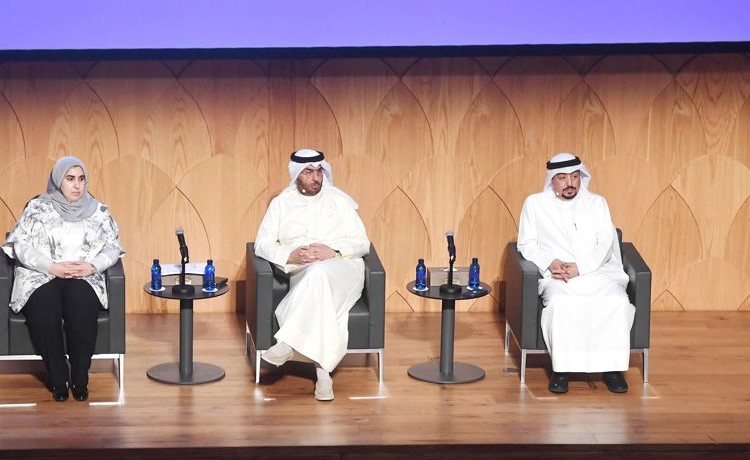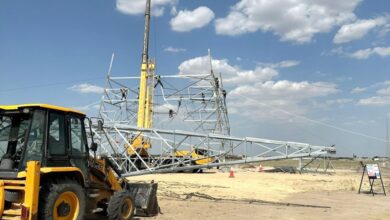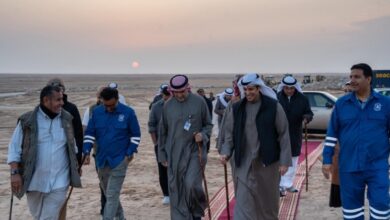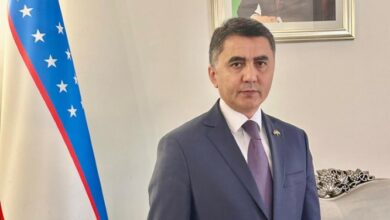Kuwait targets financial stability with KD 24.5 billion budget fix, says Al-Mudhaf
Minister of Finance and Minister of State for Economic Affairs and Investment stated diversifying sources of income involves reducing dependence on oil revenues and doubling non-oil revenues to reach KD four billion by 2027/2028.

-
Dr. Anwar Al-Mudhaf, Minister of Finance and Minister of State for Economic Affairs and Investment, stated that Kuwait is currently facing a financial deficit that needs to be controlled to ensure future financial sustainability.
-
Al-Mudhaf noted that the liquidity of the general reserve was KD 33.6 billion in March 2014, but by the end of March 2024, this balance had decreased to less than two billion dinars due to continuous withdrawals to cover the financial deficit.
-
Kuwait aims to increase the percentage of non-oil revenues in the general budget from 4% to 10% of GDP by 2030
Dr. Anwar Al-Mudhaf, Minister of Finance and Minister of State for Economic Affairs and Investment, stated that Kuwait is currently facing a financial deficit that needs to be controlled to ensure future financial sustainability. He emphasized that the Ministry of Finance’s top priorities include reducing the deficit by rationalizing spending, addressing waste, and increasing and diversifying sources of income, as reported by Al Anba newspaper.
In his speech during the “First General Budget Forum 2024,” Al-Mudhaf called on financial sector officials in government agencies to cooperate in preparing the budget for the New Year 2025/2026 and to rationalize government spending.
Addressing representatives of those agencies, he said, “You are the first line of defense in the issue of rationalizing spending and addressing sources of waste.”
He pointed out that Kuwait must achieve financial sustainability by rationalizing government spending to control budget growth, aiming to fix spending at KD 24.5 billion by 2027/2028. He noted that diversifying sources of income involves reducing dependence on oil revenues and doubling non-oil revenues to reach KD four billion by 2027/2028.
He stressed that the state aims to increase the percentage of non-oil revenues in the general budget from 4% to 10% of GDP by 2030, explaining that the current percentage of non-oil revenues is very low compared to other Gulf countries, where it is 10% in Saudi Arabia and 15% in the UAE.
Al-Mudhaf revealed a decrease in the liquidity balance of the general reserve due to ongoing withdrawals. He noted that the liquidity of the general reserve was KD 33.6 billion in March 2014, but by the end of March 2024, this balance had decreased to less than two billion dinars due to continuous withdrawals to cover the financial deficit. He explained that the substantial reserve balance had previously helped overcome deficits over the past four years, but now Kuwait faces a critical juncture and must make decisive decisions to address this situation.
Al-Mudhaf added, “We all want to return Kuwait to the renaissance it experienced in the past. The government must achieve financial sustainability by rationalizing spending, controlling budget growth, and capping expenditures at KD 24.5 billion until 2027-2028. It is also necessary to diversify sources of income, reduce dependence on oil revenues, and double non-oil revenues to reach four billion dinars by fiscal year 2027-2028 through nine initiatives proposed by the Ministry of Finance to boost non-oil revenues.
Salaries and jobs
He added that the salaries item in the general budget is constantly growing, having seen a 40% increase in recent years, reaching KD 14.8 billion in the 2024 budget compared to KD 9.9 billion in 2015.
He noted that the main reason for this rise is the cumulative increase in the number of employees by 4% since 2014, and highlighted that the ratio of salaries to GDP is 30%, the highest among Gulf countries, where this ratio typically ranges between 7% and 13%.
Regarding government employment, he explained there is undisciplined hiring, and emphasized the need to reconsider the method of evaluating employee performance to ensure prudence. He called for a practical reevaluation of employee productivity. He also emphasized that the continuous and unjustified growth in allowances must not persist, especially since many reasons for granting them have ceased.
Al-Mudhaf stressed that Kuwait provides the most support of any country worldwide, which unfortunately benefits those who do not need it. He emphasized the need for reconsideration, pointing out that consumer spending in Kuwait is the highest among regional countries, reaching KD 48 billion last year. This is largely due to support, comfortable salaries, and a generous retirement system—elements they aim to preserve but must direct more effectively.
He explained that the cumulative deficit has exceeded KD 30 billion dinars from the fiscal year 2015/2016 to the fiscal year 2023/2024, and highlighted that the available financial liquidity for budget spending is very limited. This necessitates a collective understanding that the budget requires amendment and improvement, with gradual elimination of its imbalances.
He pointed out that the Council of Ministers has tasked the Ministry of Finance with presenting its visions on financial and economic reforms, informing government agencies about areas of waste, outlining procedures to address them, and submitting a quarterly report to the Council of Ministers on financial reforms.
Al-Mudhaf emphasized enhancing government financial performance and public finance management to enhance budget preparation and address waste, stressing the need for full cooperation from government agencies. He noted that committed agencies will be recognized for their efforts.
Kuwait needs decisive decisions
In turn, Aseel Al-Munifi, Undersecretary of the Ministry of Finance, stated that Kuwait is at a critical juncture requiring decisive and serious decisions to correct the roles and paths of government agencies. She emphasized that the starting point must be rationalizing spending, diversifying sources, and strengthening the state’s financial position.
She explained that proactive measures are necessary to address the cumulative deficit in the coming years, noting that overcoming these deficits hinges on oil prices rising to between $105 and $110 per barrel.
She highlighted that a decline in oil prices could exacerbate deficits, underscoring the Ministry of Finance’s reliance on government agencies’ initiatives to enhance conditions by rationalizing spending and combating wasteful expenses.
She noted that achieving the set goals involves improving government procurement contracts to yield actual financial impacts, restructuring contracts to achieve savings, and adjusting government service pricing to cover costs while considering the impact on citizens.
Additionally, she stressed the importance of enhancing the financial performance of government agencies through medium-term budget planning and transitioning to a performance-based budgeting approach based on rationalization.
In the context of outlining necessary steps, Al-Munifi highlighted key points, such as sharing data and efficiently transferring knowledge for transparency and cooperation, implementing recommendations promptly and accurately according to set timelines, and proposing improvements while providing feedback.
During her presentation, Aseel discussed a series of critical projects aimed at diversifying the country’s income sources, stressing that these require concerted efforts rather than being mere aspirations. She added, “In addition to our financial efforts, it is our responsibility to enhance and diversify the national economy through significant development projects.”
These include initiatives like the Failaka Island development, the Shagaya Energy Complex, the Northern Economic Zone, digital economy projects, the Mubarak Al-Kabeer Port expansion, and industrial expansions.
She emphasized that these projects rely on partnerships with the private sector, ensuring a conducive business environment, and attracting talent and expertise. She noted the crucial role of participating public agencies, including the Public Investment Authority and the Kuwait Direct Investment Promotion Authority, in achieving these goals.
Al-Munaifi confirmed that the Ministry of Finance will identify areas of waste and address government agencies to review salaries, allowances, privileges, and various service contracts, including cleaning and security contracts.
Preparing estimated general budget
Saad Al-Alaati, Undersecretary of the Ministry of Finance for Budget Affairs, stated that the ministry will collaborate with other government agencies to prepare the estimated general budget for the year 2025/2026. Agencies are expected to submit their proposals by September, and the draft budget will subsequently be presented to the Council of Ministers in January 2025 for approval and implementation at the start of the fiscal year in April 2025.
Al-Alaati noted a significant variance in the budgets proposed by government agencies based on previous year’s final accounts. He urged agencies to submit well-researched budgets that align with actual expenditures, emphasizing the importance of addressing inquiries and potential repercussions to maintain alignment with the targeted plan.
Details of upcoming KD 26 billion deficits
Al-Mudhaf presented a visual overview of the future financial outlook, projecting a cumulative deficit exceeding KD 26 billion from fiscal year 2025/2026 to 2028/2029.
The presentation indicated that the upcoming fiscal year 2025/2026 is expected to have a deficit of approximately KD 4.4 billion, with total expenditures amounting to KD 26.1 billion and general revenues projected at KD 21.8 billion. It was noted that the average price of a barrel of Kuwaiti oil is forecasted to be $80, with a break-even price set at $98 per barrel.
Deficit estimates
The visual presentation indicated that for the fiscal year 2026/2027, the estimated deficit is projected to be KD 6.4 billion, with expenditures totaling 26.8 billion dinars and revenues amounting to KD 20.3 billion. The anticipated price of a barrel of oil is $75, with a break-even price set at $101 per barrel.
For the fiscal year 2027/2028, it was forecasted that the estimated deficit would be KD 7.2 billion dinars, with expenditures of KD 27.6 billion and revenues of KD 20.4 billion. The projected price of a barrel of oil is $75, and the break-even price is expected to be $105 per barrel.
Looking ahead to the fiscal year 2028/2029, the estimated deficit is projected to reach KD 8.1 billion, with expenditures totaling KD 28.5 billion and revenues estimated at KD 20.3 billion. The anticipated price of a barrel of oil is $75, with a break-even price set at $109 per barrel.
During the forum, Al-Mudhaf quoted a significant statement from the speech of His Highness the Amir Sheikh Meshal Al-Ahmad Al-Jaber Al-Sabah, which emphasized, “The sources of national wealth must not be squandered or exploited in ways that deplete resources and jeopardize national interests through proposals that waste public funds and fail to serve the public good. Instead, these proposals should contribute to the national economy.”












